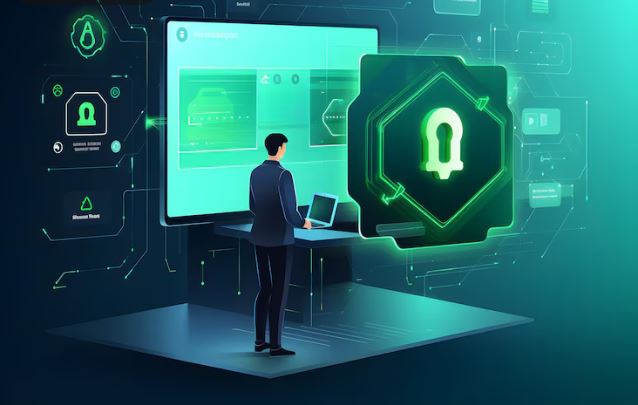I. Introduction
A. The growing need for robust information security in today’s digital landscape
In an increasingly connected world, the need for effective information security is more critical than ever. With cyberattacks and data breaches becoming more frequent, organizations face heightened risks to their sensitive information. The consequences of weak security measures are devastating, leading to financial losses, reputational damage, and legal repercussions. It is essential for companies to adopt comprehensive information security frameworks to protect their data from internal and external threats.
B. Introduction to ISO 27001 and its significance in protecting organizational data
ISO 27001 is the internationally recognized standard for information security management systems (ISMS). It provides organizations with a systematic approach to managing sensitive company information, ensuring that it remains secure and protected from unauthorized access, theft, or destruction. Implementing ISO 27001 helps businesses identify potential security vulnerabilities and address them proactively, thus safeguarding both company and customer data.
C. Overview of the ISO 27001 Internal Auditor Training Online and its benefits
The ISO 27001 Internal Auditor Training Online offers professionals the opportunity to develop essential skills in information security auditing. This flexible, accessible course equips participants with the knowledge required to evaluate and improve their organization’s ISMS. By enrolling in this training, auditors can enhance their ability to identify weaknesses, ensure compliance, and contribute to an organization’s overall information security strategy.
II. Why ISO 27001 is Crucial for Information Security
A. Explanation of ISO 27001: The international standard for information security management
ISO 27001 is the globally accepted standard for managing information security. It provides organizations with a robust framework to identify, manage, and reduce risks associated with data breaches and other security threats. By adhering to this standard, companies can effectively safeguard their assets, including intellectual property, financial information, employee data, and client records.
B. Key elements of ISO 27001: Risk management, controls, and continuous improvement
ISO 27001 emphasizes three key components: risk management, the implementation of security controls, and continuous improvement. Risk management involves identifying potential threats and vulnerabilities, while security controls are specific measures taken to mitigate these risks. Continuous improvement ensures that the ISMS evolves in response to new threats and regulatory requirements, keeping the organization’s defenses strong and up-to-date.
C. How ISO 27001 certification enhances trust, compliance, and data protection
Achieving ISO 27001 certification demonstrates a company’s commitment to information security, building trust with clients, partners, and stakeholders. It also helps businesses comply with regulatory and legal requirements related to data protection, reducing the risk of non-compliance penalties. Moreover, ISO 27001 certification enhances an organization’s ability to manage sensitive information, making it a valuable asset in today’s data-driven economy.
III. The Role of an ISO 27001 Internal Auditor
A. Responsibilities of an ISO 27001 internal auditor in maintaining an ISMS
An ISO 27001 internal auditor plays a critical role in ensuring that an organization’s ISMS complies with the standard’s requirements. Their primary responsibilities include planning and conducting internal audits, assessing the effectiveness of the ISMS, and identifying any areas of non-conformance. Auditors also work closely with management to recommend corrective actions that strengthen the organization’s information security posture.
B. Importance of internal audits for identifying vulnerabilities and ensuring compliance
Internal audits are a key component of ISO 27001 compliance, as they help identify potential security gaps and ensure that the organization’s ISMS remains effective. Regular audits allow businesses to detect vulnerabilities before they can be exploited by external threats. By conducting thorough audits, internal auditors ensure that the ISMS operates efficiently and remains aligned with the organization’s security goals and regulatory obligations.
C. Core skills required: Analytical thinking, attention to detail, and knowledge of ISO 27001 standards
To be successful, ISO 27001 internal auditors must possess a strong analytical mindset, as they are responsible for identifying complex security risks and evaluating the effectiveness of control measures. Attention to detail is also critical, as small discrepancies in an ISMS can lead to significant vulnerabilities. Additionally, auditors need to have a thorough understanding of ISO 27001 standards to accurately assess an organization’s compliance and recommend improvements.
IV. Advantages of Online ISO 27001 Internal Auditor Training
A. Flexibility and convenience: Learn at your own pace, from any location
One of the most significant benefits of ISO 27001 Internal Auditor Training Online is its flexibility. Participants can access course materials from anywhere in the world, allowing them to learn at their own pace without the need for travel or fixed schedules. This level of convenience makes it ideal for busy professionals who need to balance their education with work and personal commitments.
B. Access to expert instructors, comprehensive resources, and interactive learning tools
The online format provides access to expert instructors who guide participants through the complexities of ISO 27001 standards. Learners benefit from a wealth of resources, including video lectures, case studies, and practical exercises that help them apply their knowledge in real-world scenarios. Interactive learning tools, such as virtual audits and quizzes, further enhance the learning experience by allowing participants to test their skills in a safe, controlled environment.
C. Cost-effectiveness: Save on travel and accommodation costs
Compared to traditional classroom-based training, ISO 27001 Internal Auditor Training Online is a more cost-effective solution. Without the need for travel or accommodation, participants can save significantly on expenses. Additionally, the online format often allows for reduced tuition costs, making it an affordable option for professionals seeking to enhance their information security skills.
V. Key Components of the ISO 27001 Internal Auditor Training Online
A. Curriculum overview: Understanding ISO 27001, audit planning, conducting audits, and reporting
The ISO 27001 Internal Auditor Training Online covers a comprehensive curriculum designed to equip participants with the necessary knowledge and skills to conduct internal audits effectively. Core topics include an in-depth understanding of ISO 27001 standards, audit planning and preparation, conducting audits, and reporting findings. This structured approach ensures that participants gain a well-rounded understanding of the entire audit process.
B. Certification requirements: Course assessments, exams, and certification issuance
To achieve certification, participants must complete a series of assessments, including quizzes, assignments, and a final exam. These assessments are designed to evaluate the learner’s understanding of ISO 27001 standards and their ability to conduct internal audits. Upon successful completion, participants receive ISO 27001 Internal Auditor certification, validating their expertise and enhancing their professional credentials.
VI. How to Choose the Best ISO 27001 Internal Auditor Training Online
A. Criteria for selecting a reputable course: Accreditation, content quality, and instructor credentials
When selecting an ISO 27001 Internal Auditor Training Online, it is essential to consider the course’s accreditation. A reputable provider should be accredited by recognized certification bodies, ensuring that the course meets high industry standards. Additionally, the quality of the course content and the expertise of the instructors should be carefully evaluated to ensure a valuable learning experience.
B. Evaluating course features: Learning formats, support services, and community access
Different online courses offer various learning formats, from self-paced modules to live instructor-led sessions. It’s important to choose a course that aligns with your learning preferences. Access to support services, such as technical assistance and tutoring, can enhance the overall experience. Furthermore, some providers offer community access, allowing learners to interact with peers, share insights, and build professional networks.
C. Tips for finding the right course provider for your career needs
When comparing different providers, take the time to research their reputation and reviews from past participants. Look for providers that offer flexibility, high-quality content, and comprehensive support. Consider how the course aligns with your long-term career goals and whether it provides the skills and certification needed to advance in your profession.
VII. Conclusion
A. Recap of the benefits of ISO 27001 Internal Auditor Training Online
ISO 27001 Internal Auditor Training Online provides an exceptional opportunity for professionals to strengthen their information security auditing skills. With the flexibility to learn at your own pace, access to expert instructors, and interactive learning resources, this course offers a comprehensive learning experience. The training equips participants with the knowledge needed to ensure compliance with ISO 27001 standards, protect sensitive data, and enhance organizational security. The convenience and cost-effectiveness of online learning make it a valuable option for anyone looking to advance in their career.
B. Encouragement to invest in professional growth and strengthen security skills
As the demand for information security professionals continues to grow, investing in your professional development is essential. ISO 27001 Internal Auditor Training Online offers a pathway to acquiring valuable skills that will help you stand out in the competitive cybersecurity and risk management fields. By becoming a certified internal auditor, you not only boost your career prospects but also contribute to the ongoing protection of sensitive information in your organization. Strengthening your security skills now ensures that you remain adaptable and prepared for future challenges.
C. Call to action: Enroll in an online course and become a certified internal auditor
Take the first step toward mastering information security auditing by enrolling in an ISO 27001 Internal Auditor Training Online today. With this training, you can position yourself as an expert in ISO 27001 compliance, enhance your career opportunities, and play a crucial role in safeguarding your organization’s data. Don’t wait—invest in your future and start your journey toward certification. Enroll now and become a certified ISO 27001 internal auditor!


